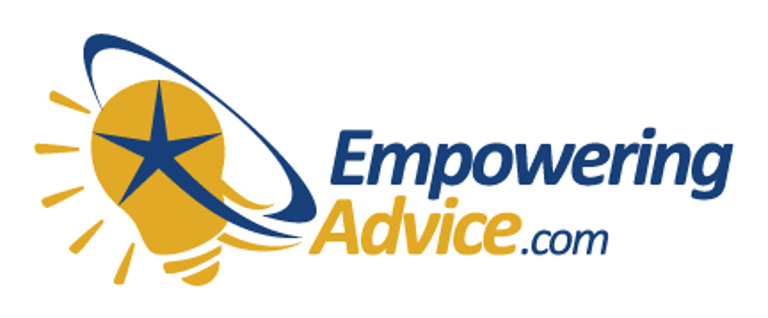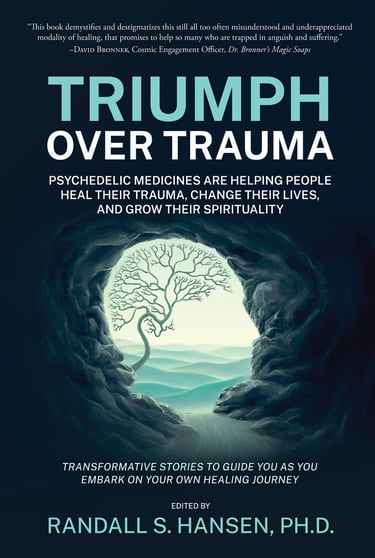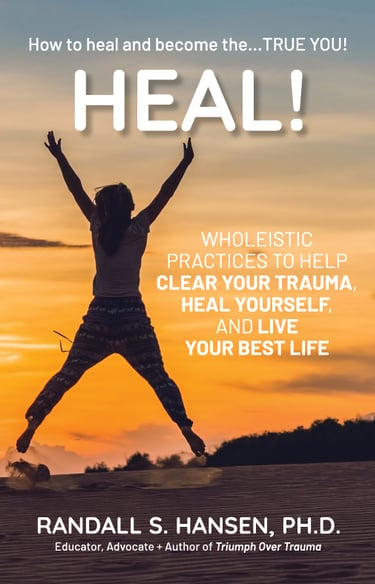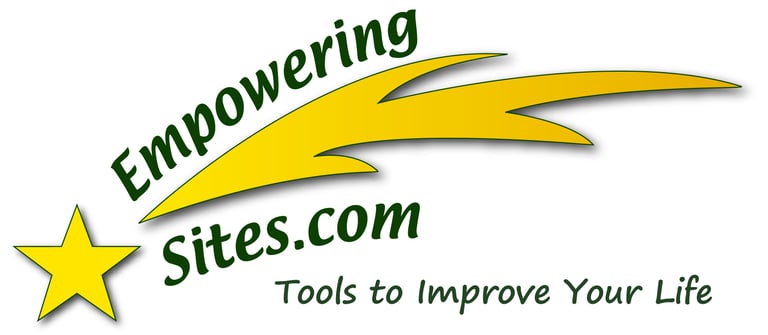Do You Really Need Those Pills? Find True Healing
Time to break our addiction -- to prescription pills.
We need to change our mindset that a pill (or a handful of pills) will solve our problems.
Take a moment before you take that daily dose of prescription drugs. How many pills do you take daily? How many do you need to be taking? I take zero, though over the years my doctors have tried to push one trendy med or another.
FYI: About two-thirds of us take at least one prescription drug -- and about half take at least two.
How surprising should it be that doctors and pharmaceutical companies have teamed up to get you hooked on more prescriptions? The prescription drug market is an almost TRILLION-dollar (annually) business, with 4 to 5 billion prescriptions filled each year in the United States.
One of the scary things one learns when you pull the curtain back on the medical community, the pharmaceutical companies, and the FDA, is that there is a lot of work done in the name of "safety" and for the "health of the public," but the reality is that the entire medical profession is a for-profit business -- and these pharmaceutical companies, especially, have gotten rich on the over-medication of our society.
When you read books like Mad in America, Overdosed America, Do You Really Need that Pill, Bad Pharma, and Selling Sickness, you get a clear picture of an industry completely out of control -- and that's even before the controversies over the pandemic vaccines.
Pharmaceutical companies are conducting questionable research, sometimes using questionable analysis tools, and often creating medications for which there is no official disorder -- but which has the potential for enormous sales.
Of course, before making any changes to your medications or lifestyle, please do your research, question your healthcare providers, and make sure if you are taking multiple prescriptions that you know why and what interactions there can be between/among them. Finally, if you are on multiple medications and you want to make some of the easy changes mentioned here, please get the advice of a doctor on the best method of tapering off these meds.
The Problem of Prescriptions
In terms of all prescription drugs, Americans filled almost 4 billion prescriptions in 2020 -- nearly 13 prescriptions for every man, woman, and child in the United States. According to the U.S. Food & Drug Administration (FDA), nearly two-thirds of all patient visits to physicians result in one or more prescriptions.
We have been told by doctors and pharmaceutical companies (through their frequent and insidious advertising) that all we need to do to feel better is take a pill -- or several pills. Often, these pills may not do anything more than mask a symptom; worse, they may cause other health problems.
One more sobering statistic: prescription drugs are the third leading cause of death after heart disease and cancer in the United States and Europe, with more than 30,000 deaths from LEGAL prescriptions... and another 2 million people who suffer from non-fatal adverse reactions ... all tied to prescription drugs that have been deemed safe by the FDA. According to the research, about half of those who die have taken their prescriptions correctly; the other half die because of errors, such as too high a dose or use of a drug despite contraindications.
Finally, if you did not know this already, know that there is a revolving door between the FDA and pharmaceutical companies -- and way too many drugs get approval that never should have been approved. (Just look to the anti-depressant or opioid fiascos.) Read more here.
Medical Conditions That Do NOT Need a Prescription
All the following five medical conditions are ones in which pharmaceutical companies and doctors push one or more prescriptions/pharmaceutical drugs -- rather than any natural methods or changes in lifestyle.
In fact, all five of these conditions can be impacted -- if not completely kept in check -- with simple changes in how you live your life.
No pill required.
1. Cardiovascular Disease (CVD). The leading cause of death around the world -- and easily mitigated with some simple diet and lifestyle changes:
Eliminate fried, sugary, high-carb processed and fast foods
Eat more fiber (such as in flax, oatmeal, fruits, vegetables)
Consume good fats (olive oil, avocado oil, grassfed butter/ghee) and eliminate bad oils (corn, sunflower, safflower, soy, vegetable, etc.)
Stop smoking
Reduce alcohol consumption
Exercise (even light to moderate, such as walking)
Obtain better, consistent sleep
Experts state that up to 80-90 percent of all CVD may be preventable -- without PILLS!
Of course, most doctors prescribe at least a statin drug for people with CVD. Statin drugs bring in tens of billions of dollars annually to the pharmaceutical companies. More than 16 million Americans now take Lipitor, the most popular statin, and drug company officials claim that 36 million more people are "candidates for statin drug therapy." One article touts: "Statin drugs are a popular way for people to lower their risks of heart attack and stroke." Other popular statin brands include Pravachol and Zocor.
Worldwide, statins bring in more than $14 billion, with it expected to reach $20 by the end of the decade.
Besides the costs of these statins, there are also side effects just to these drugs, including possibly weakening your immune system, raising the risk of diabetes, increasing muscle pain and soreness, and affecting brain health. Warning labels on some brands now carry a warning message about the possibility of diabetes, cognitive impairment, liver damage, and, of course, muscle damage.
2. Depression. In the last several decades, the number of people diagnosed and treated for depression has dramatically increased -- interestingly, that increase mirrors the increase in antidepressants and anxiolytics prescribed.
Worldwide, the global antidepressant market was valued at $15.6 billion in 2020... and is expected to reach $21 billion by 2030. In the U.S., about 1 in 5 people are on at least one antidepressant medication. Often, depression suffers are prescribed a troubling combination of benzodiazepines (such as Xanax, Ativan, Valium, Librium, Restoril) and antidepressants (such as Wellbutrin, Lexapro, Prozac, Zoloft, Effexor, Norpramin).
The main problem with these drugs -- all of them in this category -- is that they simply mask the symptoms. There is no healing or curing here, which is why many users talk of feeling "not like themselves."
Sadly, doctors seem to have forgotten the premise behind these antidepressants. These drugs were only tested for short-term use -- and yet most people, once prescribed, are on these medications for life. They are also some of the most difficult drugs to wean off.
Amazingly, taking medications for one or more of these other medical condition could be causing or adding to your depression. It seems that depression is a known side effect for these drugs: acne medications, seizure drugs, anxiety medications, beta blockers, statins, birth control pills, and opioids.
As with CVD, depression can be improved with a change in diet, an increase in exercise, exposure to natural sunlight, and better sleep... those changes and talk-therapy might be enough for the folks with mild or infrequent depression -- with no pills necessary.
Other natural healing modalities exist for depression -- true modalities for healing, not masking symptoms.
The most promising "fix" for depression? Some powerful research studies and clinic trials are showing that several types of psychedelic medicines -- taken with intention and follow-up (integration) -- have a dramatic and direct result in reducing/eliminating depression.
3. Acid Reflux. Gastroesophageal reflux (acid reflux or GERD) is when stomach acid flows into the esophagus where it doesn't belong, causing heartburn, sour liquid, sort throat, and difficulty swallowing -- in the short-term. Over time, that acid can cause damage and eventually lead to irreversible changes in the cell structures in the esophagus and increase your risk of esophageal cancer.
Some folks treat acid reflux with lifestyle changes, some people treat it with over-the-counter medications, such as antacids (Tums, Rolaids), oral suspension medicines (Pepto Bismol), and H-2 (histamine antagonists) receptor blockers (such as Pepcid and Zantac).
Then there's the estimated 15 million others take a prescription known as proton pump inhibitors (PPI), such as the popular Omeprazole (which have as possible side effects: pneumonia, kidney disease, heart attack, stroke, dementia). Nexium is the fourth leading drug prescribed. Other PPIs include Prevacid and Prilosec.
The size of the prescription market for just the PPIs is $5 billion. Combined with the other medications, it is projected to be a $10 billion market.
Why take a multitude of pills when some simple lifestyle choices can make acid reflux diminish -- and even disappear:
Eat better quality foods and avoid spicy foods (but don't eliminate healthy spices)
Eat smaller meals... slowly and deliberately
Lose weight
Get at least moderate exercise
Quit smoking
Practice stress reduction techniques
Check for side effects from various pharmaceuticals (including antidepressants, painkillers)
4.High Blood Pressure. Also called hypertension, it is a condition when blood pressure that is higher than normal -- when the Systolic Blood Pressure is elevated, typically greater than 130. Hypertension puts you at risk for heart disease and stroke.
Nearly half of adults in the United States (47 percent, or 116 million) have hypertension. Of those, about one-third -- 34 million adults -- who are diagnosed with high blood pressure take some form of medication (most commonly treated with beta-blockers). The value of the drug revenues from the sales of drugs used for hypertension are supposed to top $30 billion in the next few years.
According to World Health Organization, more than 1.13 billion people are suffering from hypertension globally. Among them, only 1 in each 5 is cured or under control. The rise in research over the next decade related to anti-hypertensive drugs to treat patients is expected to drive the global hypertension market growth.
Many factors for high blood pressure can be mitigated, including obesity, excessive alcohol consumption, lack of exercise, and smoking. (Family history of hypertension is also a risk factor for hypertension.)
As with several of the other ailments discussed here, hypertension can be reduced greatly, if not completely -- without pills -- by simply:
Eating better quality, real foods (DASH Diet)
Losing weight
Obtaining at least moderate exercise
Quitting smoking
Limit alcohol consumption
Reduce caffeine use
Find stress reduction techniques
5. Chronic Pain. Daily, ongoing pain is debilitating, but there are other ways to deal with it than through pills. Chronic pain is pain that lasts more than several months (variously defined as 3 to 6 months, but longer than "normal healing"). About 25 million U.S. adults had pain every day for the previous 3 months, and nearly 40 million adults had severe pain.
Amazingly, a variety of drugs are prescribed for chronic pain, including anti-inflammatory medications and acetaminophen; muscle relaxant medications; antidepressant medications; anticonvulsant medications, and opioids/narcotic medications.
The global pain management drugs market was valued at $71 billion in 2019, and is projected to reach $91 billion by 2027. Certainly, everyone is aware of the opioid crisis and the corruption of "pain management centers" that were purely prescription mills for people who got addicted to the drugs.
Common side effects from these drugs include: constipation, nausea, sedation, and an increased risk of falls and fractures; chronic use can lead to depression and/or sexual dysfunction; opioid overdose -- accidental or deliberate -- can lead to death.
Sadly, while opioids are the most commonly prescribed painkillers in the U.S. (with more than half of regular opioid users experiencing back pain), these drugs aren't proven to help people return to work faster, nor do they improve functioning when used for treatment of an acute episode.
In fact, most experts suggest that so-called complementary approaches may be more effective in managing pain. These techniques include acupuncture, hypnosis, massage, mindfulness meditation, spinal manipulation, tai chi, and yoga. Weight management, exercise, and better nutrition all play key roles as well.
Preliminary research into psychedelics and chronic pain is also encouraging: Researchers believe that some psychedelics, such as lysergic acid diethylamide (LSD) and psilocybin, may play a role in the management of chronic pain.
Final Thoughts on The Over Reliance of Prescription Pills
We have to break the cycle of our over-reliance on prescription medications to handle even the most basic of illnesses. These drugs are not necessarily safe, even when approved by the FDA and recommended by your doctor.
The scariest part is when we are prescribed one medication for some ailment, and then that new medication causes an unwanted side effect, which then requires another prescriptions... and then that leads to another unwanted side effect, and so on and so on.
We need to take back control of our health and lives. Prescriptions are reactive, have questionable results, and scary side effects. Changing your lifestyle is proactive, has positive results, and no negative side effects. You'll be saving your life -- and saving money at the same time.
We do NOT need a pill for everything that ails us. Yes, some medications are necessary -- even daily -- such as insulin, though not for all diabetics.
The key is becoming your own health advocate. Stop relying on your doctor (who may be getting massive perks from one or more pharmaceutical companies, stop believing all the ads you see for the drugs, and do your own research.
One final note that should scare you into action if nothing else has already: Many of the core ingredients for prescription drugs, and even some of the drugs themselves, are manufactured in China under questionable conditions -- but done so because it makes the prices (especially for generic versions) even cheaper in the U.S. market.
Additional Resources Related to Pills and Natural Remedies
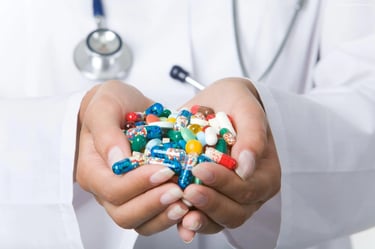

Dr. Randall Hansen is an advocate, educator, mentor, ethicist, and thought-leader... helping the world heal from past trauma. He is founder and CEO of EmpoweringSites.com, a network of empowering and transformative Websites, including EmpoweringAdvice.com.
He is the author of the groundbreaking Triumph Over Trauma: Psychedelic Medicines are Helping People Heal Their Trauma, Change Their Lives, and Grow Their Spirituality and the well-received HEAL! Wholeistic Practices to Help Clear Your Trauma, Heal Yourself, and Live Your Best Life.
Dr. Hansen's focus and advocacy center around true healing ... healing that results in being able to live an authentic life filled with peace, joy, love. Learn more by visiting his personal Website, RandallSHansen.com. You can also check out Dr. Randall Hansen on LinkedIn.
